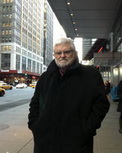 Chris
McDonnell, UK
Chris
McDonnell, UKchris@mcdonnell83.freeserve.co.uk
 Chris
McDonnell, UK
Chris
McDonnell, UK
chris@mcdonnell83.freeserve.co.uk
Previous articles by Chris
Comments
welcome here
February
8, 2017
Not in my name

He
said he’d do it and he has. I make no apologies for returning to the
issues raised by the recent election of Donald Trump to the Presidency of
the
I
would suggest that by signing the Executive Order restricting entry to the
With
such a loose cannon in the White House, we are in a difficult and
dangerous position. His unpredictability makes for an uncomfortable ride
for everyone. So what do we do?
Doing
nothing is not an option. In conscience we have to make clear our position
as Christians, for those now being rejected are, in spite of different
labels, our sisters and brothers. Our voices, clergy and laity alike must
ring out in opposition to an action that is both hazardous and plainly
wrong. Opposition to the planned State visit has grown day by day.
Yet
buried within all the angst and hurt, echo the words of the great English
mystic, Julian of Norwich; ‘…but
all shall be well, and all shall
be well, and all manner of things shall be well.'
The hope of
Christian faith lies at the centre of our belief. Without hope, the
journey is indeed bleak.
But
don’t let us be deceived, our contribution to changing circumstances is
vital. It is not sufficient to sit back and hope for better weather, for
that would be an act of negligence.
The
inspiration of Francis has given hope to the Church in so many ways. His
voice has been heard for he has been courageous enough to speak on issues
that others have ignored, and he has been heard beyond the boundaries of
the Catholic Church.
Recently
it has been reported on the ‘
Since
2011 we have a language that is, to say the least, clunky, using phrases,
sentence structure and tone do not reflect the experience of our people.
Before it was finally published, Fr Michael Ryan, of the Cathedral parish
of St James in
http://www.americamagazine.org/faith/2017/01/26/pope-francis-has-ordered-review-new-mass-translation
The
action of Francis in calling for the Review is another mark of the courage
of the man.
A
few days ago, January 30th, marked the anniversary of the
assassination of Mahatma Gandhi in
Gandhi
is reported to have said that ‘I
like your Christ but not your Christians’. What a responsibility is
placed on our shoulders when we take that name. It may have the weight of
the cross but we are accountable to the Lord for its acceptance in what we
do.
Returning
to the opening paragraphs, the words that follow were written the weekend
the Executive Order was signed. With Julian of Norwich, let’s hope that
‘all will be well’ and in the meantime be willing to be a voice
for justice for those being treated unjustly.
Signature
I’ve
signed a piece of paper.
Go
back home
and
wait your turn
and my decision.”
No matter what you find
when you return,
whether your bed and chair remain,
wait in front of breakfast plates
for armed enquiry of your presence,
sent for your removal
to another place of safety,
chosen by those whose actions
you protested by your arrival
at our border.
The Order has been signed
and a history of promised
words of welcome
lost in the dust and noise
of rhetoric.
Failing to recognise your sightless fears,
blurring eyes through your falling tears,
I say again,
“No, you can’t come in.”
END
---------------